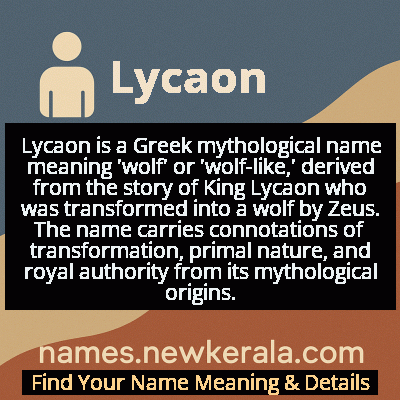Lycaon Name Meaning & Details
Origin, Popularity, Numerology Analysis & Name Meaning of Lycaon
Discover the origin, meaning, and cultural significance of the name LYCAON. Delve into its historical roots and explore the lasting impact it has had on communities and traditions.
Name
Lycaon
Gender
Male
Origin
Greek
Lucky Number
7
Meaning of the Name - Lycaon
Lycaon is a Greek mythological name meaning 'wolf' or 'wolf-like,' derived from the story of King Lycaon who was transformed into a wolf by Zeus. The name carries connotations of transformation, primal nature, and royal authority from its mythological origins.
Lycaon - Complete Numerology Analysis
Your Numerology Number
Based on Pythagorean Numerology System
Ruling Planet
Neptune (Ketu)
Positive Nature
Intuitive, analytical, spiritual, and inquisitive.
Negative Traits
Secretive, reserved, aloof, and can be overly critical.
Lucky Colours
Green, yellow.
Lucky Days
Monday.
Lucky Stones
Cat’s eye, moonstone.
Harmony Numbers
1, 5, 6.
Best Suited Professions
Scientists, researchers, spiritual leaders, detectives.
What People Like About You
Depth of knowledge, analytical skills, spirituality.
Famous People Named Lycaon
Lycaon of Arcadia
Mythological King
Central figure in Greek werewolf mythology, transformed by Zeus for sacrilege
Lycaon (son of Priam)
Trojan Prince
Mythological prince of Troy during the Trojan War era
Lycaon pictus
Biological Species
African wild dog species named after the mythological figure
Name Variations & International Equivalents
Click on blue names to explore their detailed meanings. Gray names with will be available soon.
Cultural & Historical Significance
The myth's endurance demonstrates how ancient stories continue to shape modern understanding of human nature. In contemporary contexts, Lycaon appears in scientific nomenclature (Lycaon pictus for the African wild dog), fantasy literature, and psychological discussions about the 'beast within.' His story serves as a permanent cultural reference point for exploring the boundaries of humanity, the consequences of challenging divine order, and the complex relationship between civilization and primal instincts.
Extended Personality Analysis
The name Lycaon evokes a personality marked by intense leadership qualities and transformative potential. Those bearing this name are often seen as natural rulers or influential figures, possessing the confidence and ambition that characterized the mythological king. However, this strong personality comes with warnings—the original Lycaon's downfall suggests potential for arrogance and testing boundaries beyond acceptable limits.
There's a distinct duality to the Lycaon personality, reflecting the human-wolf transformation myth. Such individuals may demonstrate fierce loyalty and protective instincts toward their inner circle, while simultaneously possessing independent, survival-oriented traits. The mythological background suggests someone capable of profound personal transformation, whether through self-improvement or moral decline. This complex character combines royal authority with primal instincts, creating a personality that is both commanding and potentially volatile, always balancing civilized behavior with underlying wildness.
Modern Usage & Popularity
In contemporary naming practices, Lycaon remains exceptionally rare and niche, primarily appealing to classical scholars, mythology enthusiasts, and parents seeking distinctive names with powerful mythological resonance. The name has never achieved mainstream popularity and doesn't appear in official baby name rankings, maintaining its status as an academic or literary choice rather than a conventional given name. Its usage is almost exclusively limited to male children and tends to be concentrated within communities with strong classical education backgrounds. The scientific association with the African wild dog has given the name some exposure in conservation circles, but this hasn't significantly impacted its adoption as a human name. Current trends suggest it may see slight increases in usage as mythological names gain some popularity, but it's likely to remain an uncommon choice.
Symbolic & Spiritual Meanings
Symbolically, Lycaon represents the profound transformation between human civilization and animal nature, serving as a powerful metaphor for the beast within all humans. The wolf transformation symbolizes both the loss of humanity through immoral actions and the unleashing of primal instincts and survival capabilities. This duality makes the name emblematic of moral testing and the consequences of challenging established order. The myth also symbolizes divine punishment and the permanent marking of transgression, as Lycaon's transformation was irreversible. In positive interpretations, it can represent adaptability, fierce protection of one's community, and the raw power of nature. The enduring symbolism warns against hubris while acknowledging the complex interplay between civilized behavior and underlying primal drives that characterize human experience.

